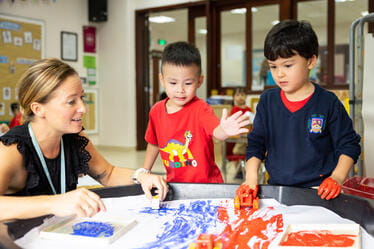Ten top tips for reading at home Reading outside school is one of the most beneficial activities your child can engage in - not just in literacy, but across all subjects. Here are some tips for how to engage your child with reading during this time.
Reading outside school is one of the most beneficial activities your child can engage in - not just in literacy, but across all subjects. Here are some tips for how to engage your child with reading during this time.
1. If your child is a voracious reader and has nearly finished all the books they have at home, they can also borrow ebooks and audiobooks online from the school library. A video for how to do this can be found here.
2.Use this time to build a dream reading list for when they next visit a bookshop or the BIS library. The website Lovereading4kids lets you read extracts from brand new books! Children can also post their reviews so they feel like part of a reading community.
3. The best part of finishing a book is talking to someone about it afterwards! Ask your child questions about what they have been reading. You don’t have to have read the book, some good questions are - who was your favourite character? What was the most surprising part of the book? Did you like the ending - is there anything about it you would have changed?
4. This is also a great time for your child to read in their home language, particularly a more challenging, classic book. If they know the story, they will be much more confident to tackle it in English.
5. Reading non-fiction is also a really important way to develop as a reader. Twinkl and BBC Newsround post age-appropriate news stories online (with fake news quizzes) that will let your child learn more about the world while building reading skills!
6. Epic has thousands of e-books, for all ages, on every possible subject. If you haven’t signed up at home already, everyone is entitled to a free 30-day trial.
7. Read stories from children all around the world, and even try writing your own! The 100 Word Challenge is done by schools around the world, and challenges children to write a story in just 100 words - with a new prompt each week. Read crazy and creative stories from other children and then create your own - send any entries to Miss Hull.
8. Make reading active - children could build a den to read in, draw or paint a picture from what they are reading, or even cook something from their favourite story. There are so many fun activities that can be based around reading.
9. Where possible, let your child see you reading - they are much more likely to build strong reading habits when they see you enjoy reading too! Take time to read aloud to your child during the day - whether that’s a story before bedtime, a news article in the morning, or a cosy break between remote learning tasks. Siblings can read to each other too.
10. Set up a book club between friends - it could be in person if they live nearby, or online. Everyone can read the same book/series, or read on a theme. You can even swap books if everyone is looking from something new to read.
Happy reading!
Annie Hull
Librarian






